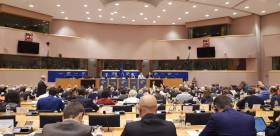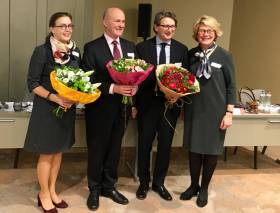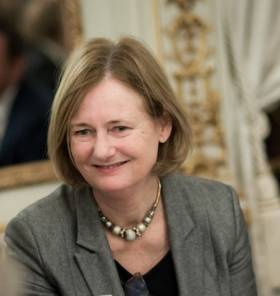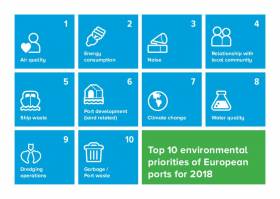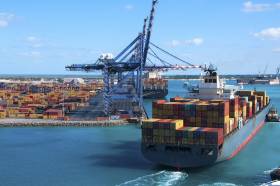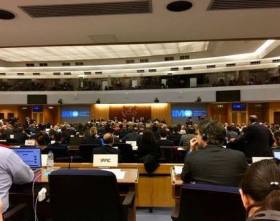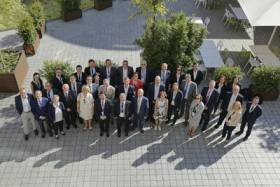Displaying items by tag: ESPO
EPSO Welcome European Parliament Transport Committee Result on Connecting Europe Facility II
#Ports&Shipping- At the European Parliament's Committee on Transport and Tourism and the Industry Committee jointly yesterday adopted the Marinescu- Telička- Virrkkunen report on the Connecting Europe Facility proposal 2021-2027.
The European Sea Ports Organisation (ESPO) welcomes the demand for an increased budget for transport. Members of the committees voted to raise the general envelope of the CEF transport budget by €7bn to €33.51bn (in constant prices). The significant role of transport for the development of the Union had been equally recognised by the Parliament’s request for a higher CEF transport budget during the vote on the next MFF.
ESPO particularly appreciates the recognition of the cross-border potential of port projects. Port projects, which are carried out in one Member State, can nevertheless have a substantial cross-border impact, by enhancing connectivity on the sea side, or in the hinterland beyond the borders of a single Member State.
For the first time, the Commission proposed to include an envelope for military mobility in the transport budget. With their vote the Committees have strengthened the civilian priority of dual-use projects eligible under this priority, which addresses one of ESPO's main concerns. ESPO welcomes the broadening of the scope from the exclusive focus on enabling the movement of military troops and equipment, to also cover investments in cyber security resilience and for security and civil protection purposes.
ESPO Secretary-General Isabelle Ryckbost said: "We would like to congratulate the Transport Committee and thank in particular the rapporteurs for achieving a compromise that clearly strengthens the Commission proposal in terms of budget but also in terms of priorities. The Parliament clearly recognizes the importance of strengthening the cross-border connectivity not only on the land side but also on the maritime side. We hope a solution can be found with the Council, which gives the necessary importance to Motorways of the Sea. In the last 3 years only 4 % of the budget was spent on port projects, whereas 95% of world trade goes over sea and 70% of rail freight is coming from the ports."
ESPO remains concerned about the priorities listed in the Annex. Both, Motorways of the Sea (MoS) as a horizontal priority, as well as all maritime and port projects, which are included in the current CEF priorities, have been deleted from the listed priorities.
ESPO considers the maritime dimension of the TEN-T network, and ports as the strategic links between waterborne and land-based transport, as fundamentally important for the connectivity within Europe and with third countries. This importance should be better reflected by the Connecting Europe Facility 2021-2027.
The vote of the European Parliament has been scheduled for the December plenary. The negotiations between Council and Parliament are expected to start early 2019.
#Ports&Shipping - Eamonn O’Reilly has been unanimously re-elected as European Sea Ports Organisation (EPSO) Chairman following a vote of the organisation's General Assembly in Brussels yesterday afternoon.
For the past two years O’Reilly has been chairing ESPO in addition he is the Chief Executive of the Dublin Port Company since 2010.
The General Assembly also re-elected Annaleena Mäkilä and elected Zeno d’Agostino as Vice-Chairs. Ms Mäkilä is currently Managing Director of the Finnish ports Association and has been Vice Chair since 2014. Mr d’Agostino is President of Assoporti, the Italian Association of Ports and President of the Port Network Authority of the Eastern Adriatic Sea. Z. d’Agostino replaces Bernard Mazuel (UPF-France) who has been Vice Chair for the last four years.
Upon his election, Mr O’Reilly said: “I am very honoured to have been asked by my colleagues in the European port industry to continue as Chairman of ESPO for another two years. ESPO is a creation of the movement to realise the Single European Market and for 25 years has represented the interests of our industry in dialogues with the European institutions. The EU and ESPO are much changed over this time and new challenges lie ahead. The first 25 years of ESPO has coincided with the creation of the legislative framework for Europe’s ports. The next 25 years will be more about implementation. This change of emphasis sees ESPO adapting to the needs of its member ports with value-adding initiatives such as EcoPorts, PortinSights, the new Port Business Platform and the now ten year old ESPO Award promoting port-city integration. These initiatives will be of increasing importance in the years ahead as ESPO and the EU respond to the forces of change."
During its General Assembly, ESPO also published its Annual Report 2017-2018, which outlines the activities of the organisation over the past year. A copy of the report can be found here.
ESPO also congratulates Port of Dublin, for renewing EcoPorts’ environmental management standard (PERS). Isabelle Ryckbost, ESPO’s Secretary General, Sotiris Raptis, EcoPorts coordinator, and Zeno d'Agostino, ESPO Vice-Chair handed over the PERS certificate to the port representative during the General Assembly.
Being PERS certified requires amongst others that the port increases transparency by making its environmental report publicly available. It also implies that the port is effectively monitoring the environmental challenges and is implementing an improved environmental management.
“PERS has been the flagship of the EcoPorts network being the only port specific environmental standard. The transparency requirements of PERS enable ports to enhance their relationship with local communities and their market reputation within the supply chain. We encourage all ports to join EcoPorts in order to further improve their environmental performance and communicate their environmental policy,” says EcoPorts coordinator, Sotiris Raptis.
One third of the 98 EcoPorts members have now acquired PERS. Compliance with the PERS standard is independently assessed by Lloyd’s Register and the certificate has a validity of two years. PERS is revised after the 2-year period to make sure that the port continues to meet the requirements.
In addition (last night) was to be the celebration of the 25th Anniversary of ESPO and the 10th annual ESPO Award on Societal Integration.
The theme of this year’s ESPO Award is ‘Ports as a Good Work Environment for Everyone’. Deputy Director-General of DG Move Maja Bakran will be announcing the winner at a ceremony taking place at ‘Palais des Académies’ in Brussels. (Award winner to be known at around 10.15 pm)
Clune-Draft Report Welcomed By ESPO On European Maritime Single Window Environment
#Ports&Shipping - The European Parliament’s Committee on Transport and Tourism on 15th October published the draft report on the Commission’s proposal for a Regulation establishing a European Maritime Single Window environment, which came out on 17 May.
The rapporteur, MEP Deirdre Clune (EPP-Ireland) rightly focuses in her draft report on the harmonisation of data elements and data sets, advocates the cooperation between customs and maritime authorities at both national and Union level and recognises that, even with a fully harmonised data set, competent authorities might for some reasons require additional data. The draft report moreover states that Member states should allow the use of port community systems, as long as those systems are then passing the necessary information to the National Single Window. The rapporteur also stresses the need to provide National Single Windows with a governance dimension and takes a realistic approach concerning the reporting only once principle.
“The draft report of Ms Clune shows a clear ambition to move towards further harmonisation. It will oblige all stakeholders, including port authorities, to set serious steps. It however also recognises the initiatives and investments already in place or under development to achieve a more efficient reporting environment for ships. We believe this draft report further improves the Commission’s draft proposal. The draft report is a solid basis for further discussions. We support the main lines and hope that it can be supported by the Transport committee. This file is already for a long time on the agenda of both EU policy makers and the port and maritime industry. We believe that with these proposals a deal can be reached very quickly with the Commission and the Council, allowing an adoption before the European elections,” says Isabelle Ryckbost, ESPO’s Secretary General.
European ports remain however concerned about the development of a harmonised reporting interface module for the National Single Windows. They fear that such a solution will not be flexible to respond to fast moving technological developments in the field.
The draft report will be discussed in the Transport Committee on 5 November.
The ESPO position on the proposal can be downloaded here.
Environmental Report from ESPO Focuses On Top 10 Environmental Priorities In European Ports
#Ports&Shipping- The annual Environmental Report for 2018 (download) published by the European Sea Ports Organisation (ESPO) was presented yesterday at the GreenPort Congress in Valencia, Spain.
The ESPO Environmental Report includes environmental performance benchmark indicators as well as the Top 10 Environmental Priorities (download postcard) of the European ports for 2018.
Air quality has remained the top priority of the European ports since 2013. The increased interest in the relationship with local community in position 4 of the list is relevant as air quality has been increasingly a concern for citizens of port cities and urban areas.
Climate change is becoming of high relevance for European ports. It made it in the Top 10 for the first time in 2017 and climbed to the position 7 in 2018. Almost eight out of ten European ports take into consideration climate change when they develop new infrastructure projects. Furthermore, 59% of ports strengthen the climate resilience of existing infrastructure and 41% of them have already dealt with operational challenges due to climate change.
Marine litter-related priorities went also higher in the Top 10 list compared to last year. Waste was the most monitored issue increased by 17% since 2013. This indicates the readiness of ports to contribute to addressing the issue of marine litter.
73% of the ports are certified under an environmental standard (ISO, EMAS, PERS) increased by 19% since 2013, while 68% of them make their environmental report publicly available. On the development of alternative fuels infrastructure, the report finds that 24% of the ports provides high voltage shore-side electricity for ships at berth and 30% of them with LNG refueling points, while another 24% is currently developing LNG infrastructure projects.
“ESPO publishes its annual ‘check-up’ for the European ports, the benchmark indicators, which become a point of reference for the environmental performance of the sector. The report will be a good source of information for all interested stakeholders, local communities, civil society, researchers and industry.
On alternative fuels infrastructure, we see increased investments on the port side but we believe that related port investments would accelerate if the remaining barriers for uptake are addressed. For instance, energy taxation on electricity has been a significant barrier for the uptake of shore-side electricity for ships, being often the reason why it does not make a strong business case.
We are aiming to include more indicators in the report of next year. We also encourage all ports to join EcoPorts in order to improve their environmental performance, better communicate their environmental policy and broaden the sample of ports that feed into the annual benchmark performance of the sector.” says ESPO’s Secretary General, Isabelle Ryckbost.
The data for the report was obtained from the responses of 90 EU ports to the EcoPorts Self Diagnosis Method (SDM), a tool developed for identifying and monitoring environmental risk and establishing priorities for action and compliance (www.ecoports.com). The SDM is updated by EcoPorts’ members every two years.
European Ports Welcome Parliament’s Explicit Support to Remove Tax Barriers for Shore-Side Electricity for Ships
#Ports&Shipping - The European Parliament's Transport Committee supported yesterday the removal of tax barriers for the uptake of shore-side electricity supply (OPS) in ports for ships at berth.
The Ertug report on the deployment of infrastructure for alternative fuels in the EU which was voted by the Transport committee, pointed out that taxation has a major impact on the price competitiveness of alternative fuels and underlined that disparities in energy taxation for shore-side supply for ships should be addressed.
European ports welcome the vote in the Parliament and believe that energy taxation on electricity has been a significant barrier for the uptake of shore-side electricity for ships, being often the reason why it does not make a strong business case.
Currently, electricity produced from the combustion of marine fuel on board of ships is tax-exempt. But, when ships at berth are plugging into the shore-side electricity system, they have to pay taxes applied to electricity. Sweden, Germany and Denmark have been provided under the Energy Taxation Directive with a permit to temporarily apply a reduced rate of taxation to shore-side electricity for ships.
ESPO believes that a permanent and EU wide tax exemption for the use of shore-side electricity under the Energy Taxation Directive, would put it on an equal footing with electricity generated on board of ships produced from the combustion of tax-exempted marine fuel.
“Ports in Europe are investing a lot in on shore-side electricity infrastructure (OPS). The tax barriers, which make it for ships more expensive to plug in, have resulted in OPS installations which are often underused. The vote in the Parliament gives a strong signal. A permanent and European tax exemption for shore-side electricity for ships at berth would take away a great disadvantage of using electricity and would enhance its uptake, allowing ports and their surrounding communities to reap the environmental benefits of these costly investments. The uptake of OPS would contribute to further improving air quality and achieving the EU climate targets. On top of that it reduces the noise of ships at berth. We now hope that the message also reaches the Commission, the national governments and the Ministers in charge of taxation issues,” says ESPO’s Secretary General, Isabelle Ryckbost.
ESPO welcomed that the Evaluation and Fitness Check Roadmap of the European Commission on the evaluation of the Energy Taxation Directive (2017) made a reference to an exemption on shore-side electricity for ships.
To find out more on information about ESPO’s position click here to read or download.
ESPO Welcomes Commission's Proposal to Regulate European Maritime Systems Data But Wants More Ambition on Harmonisation
#Ports&Shipping - The European Sea Ports Organistion (ESPO) has welcomed the Commission’s proposal for a Regulation establishing a European Maritime Single Window environment (COM2018 278 final).
For European ports though, reducing the administrative burden in maritime transport and facilitating trade is a top priority. ESPO wants more ambition on the harmonisation of data definitions and data sets, while maintaining the existing reporting systems. This would further reduce the administrative burden and would facilitate trade. This is the guiding principle of ESPO’s position paper (read or download) in response to the Commission’s proposal for a Regulation establishing a European Maritime Single Window environment which was published on 17 May.
For European ports, the first priority should be to simplify administrative procedures by ensuring that the same data sets can be reported to each competent authority in the same way. In this context, ESPO welcomes the establishment of a harmonised data set. However, there is still work to be conducted to define the data set in detail - both data elements and data definitions. At the same time, ESPO agrees with the proposal to allow Member States to introduce or amend data requirements as in some cases ports might need to ask additional data to respond to exceptional circumstances. In that respect, this flexibility should also be extended to individual competent authorities.
The ESPO in particular welcomes that the proposal builds upon the existing National Single Windows, while also allowing the reporting to be carried out through the Port Community Systems (PCS). The proposal rightly acknowledges the well functioning of PCS’s and the investments already made. European ports highlight that any solution should be technology neutral and should focus on data harmonisation.
Furthermore, a governance mechanism for the National Single Window should be established giving it the competence to store and redistribute data to the respective authorities. Otherwise, the proposal would not result in trade facilitation and simplification, but would just shift the burden from the ship side to the competent authorities.
ESPO considers the “reporting once principle” a valid means to achieve the objectives of the proposal, provided that it covers the re-use of data that do not change between subsequent port calls and takes into consideration the limited amount of data to be reused between authorities at a given port call.
"We appreciate that the proposal acknowledges to a large extent and builds upon the current reporting environment in maritime transport. Across the sector there is a strong wish to simplify and reduce the administrative barriers. We can however not ignore the mandatory reporting obligations shipping, ports and other authorities need to comply with by national, European and international law. We believe that working on harmonised data standards is the only way forward to make the reporting more efficient. Common standards are far more important than harmonised systems. Technology is moving fast. We need a legislative framework that allows the use of already well functioning systems and the uptake of new technologies. A reporting environment should not undermine the ongoing digitalisation processes, and encourage the uptake of new solutions in a technology neutral way,” says ESPO’s Secretary General, Isabelle Ryckbost.
The proposal is currently being discussed in the Council and the European Parliament. MEP Deirdre Clune (Ireland/PPE) has been appointed as rapporteur in the Transport committee. ESPO looks forward to working with the Parliament’s rapporteurs and the shadow rapporteurs, the Austrian Presidency, the Council and the Commission in view of achieving a new and efficient legislative framework that would further reduce the administrative burden in maritime transport and facilitate trade.
ESPO Welcomes Draft Report but Calls for Stricter Application of ‘Polluter Pays’ Principle
#PolluterPays- European Sea ports Organisation (ESPO) have welcomed proposals put forward by the European Parliament Rapporteur Ms Gesine Meissner in the draft report of the Transport Committee on the review of the Waste Reception Facilities Directive (Com (2018) 33). The Draft Report will be discussed in the Transport Committee meeting of today, 10 July.
The proposals of the Parliament’s rapporteur are aiming to better protect the marine environment and decrease the administrative burden for stakeholders. ESPO welcomes in particular proposals such as the definition of catering waste which would increase the quantities of recycled plastics and contribute to the targets of the European Plastics Strategy.
European ports believe however that the ‘polluter pays’ principle, which has been the cornerstone of the EU’s environmental policy, needs to be strengthened. Introducing a fee system whereby ships would deliver unreasonable quantities of garbage, including dangerous waste for a fixed fee would be a severe divergence from the ‘polluter pays’ principle. It risks to discourage reducing waste at the source.
“The report of Ms Meissner is clearly a step forward. Overall, the report pursues the objectives of the circular economy and aims to reduce administrative burden for authorities and stakeholders. We strongly believe however that the ‘polluter pays’ principle needs to be better reflected in the new Directive. We cannot accept a regime whereby ships are not incentivised to limit waste at the source and ports have to carry the costs of delivering unreasonable amounts. Additionally, we oppose an automatic rebate for “green” ships. Any green rebate, if not corresponding to a real cost reduction, will have to be borne by the port authority. Not all port managing bodies have the financial ability to cover this cost and to give such rebates. We plead for an efficient, but responsible management of ship waste. We count on the rapporteur and Transport Committee members to further optimise the Directive in that sense” says ESPO’s Secretary General, Isabelle Ryckbost.
Any mandatory green rebates for waste, as proposed by the Commission proposal, would prevent ports from addressing local environmental challenges. In some areas, waste pollution is a great environmental concern while in others it is air quality and emissions. Furthermore, mandatory rebates disregard the existence of different business and governance models in ports across Europe.
The Commission has been preparing an EU submission to the IMO proposing a 100% indirect fee without quantity thresholds at international level (here). “I regret that a submission is being introduced to the Council when Parliament has not expressed any views, and negotiations with the Council have not even started. This initiative seems to bypass the ongoing democratic process and lacks legitimacy” adds ESPO’s Secretary General, Isabelle Ryckbost.
#Ports&Shipping - European ports is where ship waste has been one of the main environmental priorities, as indicated in the ESPO 2017 Sustainability Report.
In its position paper on the revision of the Port Reception Facilities Directive, the European Sea Ports Organisation (ESPO) welcomed the Commission proposal and its objective to build upon the substantial progress achieved under the existing Directive.
The existing Directive 2000/59 has contributed to decreasing significantly waste discharges at sea. The minimum fixed fee, which has to be paid by all ships calling at EU ports, regardless of whether they use the waste facilities or of the quantities they deliver, has delivered. As a result, only 2.5% of oily waste is not delivered at waste facilities in ports.
European ports support, in particular, the proposal’s objectives to increase efficiency and reduce administrative burden. The new Directive should, however, also make sure that efficient but responsible regime for managing ship waste is encouraged, in line with the ‘polluter pays’ principle.
“European ports recognise that providing the right incentives is essential and port authorities are certainly willing to contribute. However, introducing a fee system whereby ships could deliver unreasonable amounts of garbage, including dangerous waste for 100% fixed fee, would be a severe and unacceptable divergence from the ‘polluter pays’ principle. It risks to discourage tackling waste at the source by reducing waste volumes onboard, which has been the cornerstone of the EU waste policy” says ESPO’s Secretary General, Isabelle Ryckbost.
ESPO therefore proposes to set a limit on waste covered by the 100% fixed fee. The fixed (flat) fee should cover normal quantities of waste delivered by a certain type and size of ship. Ports should be allowed to charge on top of that if unreasonable quantities are delivered. Furthermore, dangerous waste, which usually needs special and costly treatment, should not be covered by the 100% indirect fee.
European ports believe, moreover, that any provisions leading to better enforcement of the obligation for ships to deliver waste at shore are welcome. The alignment of specific elements of the Directive with the International Convention for the Prevention of Pollution from Ships (MARPOL) is supported by ESPO. European ports also welcome that new types of waste, such as scrubber waste, have been addressed by the proposal.
The proposal is currently being discussed in the Council and the European Parliament. ESPO looks forward to working with the Parliament’s rapporteurs and the shadow rapporteurs, the Bulgarian Presidency, the Council and the Commission in view of achieving a new and efficient legislative framework that would further reduce ship generated waste discharged at sea and increase waste quantities delivered at ports.
#Ports&Shipping - The European Sea Ports Organisation (ESPO) welcomed the agreement reached at global level within the IMO to peak CO2 emissions from shipping as soon as possible and reduce them by at least 50% by 2050, compared to 2008 levels.
For European ports, the agreement reached last week is a real milestone and sends a strong signal that the IMO can take action.
Shipping being a global industry, ESPO believes that the IMO is the best placed to make progress. In this context, ESPO underlines the instrumental role of the EU and its different stakeholders in reaching this global agreement.
“A clear signal has been sent by the IMO; shipping now has a reduction target and the sector will take action to decarbonise in line with the objectives of the Paris Agreement. The clear support of EU stakeholders - both from port and shipping side - to the EU negotiators has delivered. This momentum should be used to continue on the same path towards developing concrete measures to implement the agreement. We hope that here again the EU can play an important role,” says the Secretary General of ESPO, Isabelle Ryckbost.
ESPO believes that meaningful measures should be developed and introduced as soon as possible and by 2023 at the latest in order to implement the targets agreed on. European ports point out that the nature of the measures and their timing will steer to a large extent the infrastructure investments to be made by ports to facilitate the decarbonisation of the maritime sector.
“The European Commission is currently preparing the new legislative framework for the financing of the TEN-T network for the period 2021-2027. Decarbonisation is expected to be one of the main pillars of the new Connecting Europe Facility proposal. It will provide funding and support for the corresponding transport infrastructure investments. The sooner we have measures the shipping sector will agree on identified and rolled out, the better the ports can plan adequate investments and benefit from the tools offered by the new CEF. Clarity regarding the measures will also help EU policy makers to set the priorities for the next period. This is in the interest of both European ports and the shipping sector”, adds Isabelle Ryckbost.
Finally, ESPO believes the agreement is certainly a milestone, but should not be seen as an endpoint. Discussions on the level of ambition and the reduction target should continue and be revised in the future in line with the EU proposal.
Irish Ports Among More than 30 Ports Certified with EcoPorts PERS Environmental Standard
#IrishPorts - Since its establishment, EcoPorts has for the first time reached the number of 32 ports certified with the environmental performance standard of the network (PERS).
Among the Port Environmental Review System (PER) certified ports, Afloat has identified two Irish ports: Dublin Port Company and Shannon Foynes Port Company.
Set up in 1997, EcoPorts operates under the European Sea Ports Organisation (ESPO) and is the main bottom-up initiative of the European ports to address the environmental challenges the sector faces.
Being PERS certified requires amongst others that the port increases transparency by making its environmental report publicly available. It also implies that the port is effectively monitoring the environmental challenges and is implementing an improved environmental management. PERS facilitates ports to comply with legislation and meet customer expectations. Additionally, ports’ environmental performance is increasingly taken into account ("factored-in") in calculations of the premium by major insurance companies; standards such as PERS are recognized as components of a sustainable approach.
“For many ports, PERS certification is the cherry on the cake, rewarding years of day-to-day engagement towards improving environmental management. We know that many other ports are meeting the requirements and are eligible for PERS certification. We hope that they will apply for the certificate. It must be seen as a quality mark for environmental sustainability. Both consumers and shippers are increasingly paying attention to a sustainable supply chain. These certificates can enhance the transparency and help them making the right choices”, says Secretary General of ESPO, Isabelle Ryckbost.
“The steady increase of the ports certified with the PERS standard, is remarkable and indicates the readiness of ports to address the environmental challenges, be transparent in communicating their environmental policy, build an even closer relationship with port cities’ communities and enhance their market reputation. We encourage all ports to join EcoPorts and obtain the PERS standard” says the EcoPorts coordinator, Sotiris Raptis.
One third of the 93 EcoPorts members have now acquired PERS, which is the only port specific environmental management standard. Compliance with the PERS standard is independently assessed by Lloyd’s Register and the certificate has a validity of 2 years. PERS is revised after the 2-year period to make sure that the port continues to meet the requirements.
The EcoPorts tools are available to ports and terminals outside Europe through the ECO Sustainable Logistic Chain Foundation (ECOSLC).



























